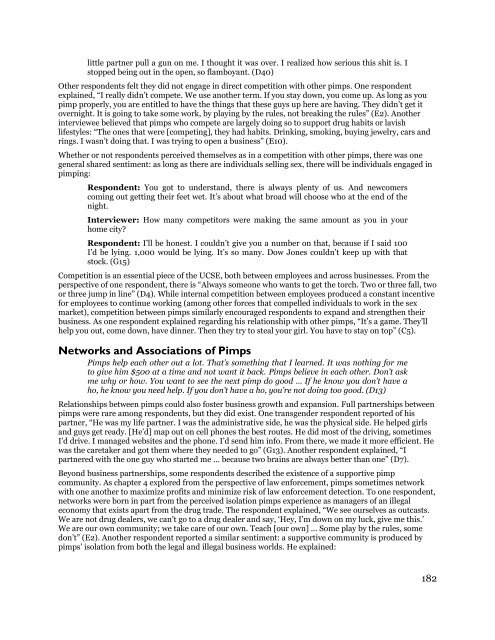413047-Underground-Commercial-Sex-Economy
413047-Underground-Commercial-Sex-Economy
413047-Underground-Commercial-Sex-Economy
You also want an ePaper? Increase the reach of your titles
YUMPU automatically turns print PDFs into web optimized ePapers that Google loves.
little partner pull a gun on me. I thought it was over. I realized how serious this shit is. I<br />
stopped being out in the open, so flamboyant. (D40)<br />
Other respondents felt they did not engage in direct competition with other pimps. One respondent<br />
explained, “I really didn’t compete. We use another term. If you stay down, you come up. As long as you<br />
pimp properly, you are entitled to have the things that these guys up here are having. They didn’t get it<br />
overnight. It is going to take some work, by playing by the rules, not breaking the rules” (E2). Another<br />
interviewee believed that pimps who compete are largely doing so to support drug habits or lavish<br />
lifestyles: “The ones that were [competing], they had habits. Drinking, smoking, buying jewelry, cars and<br />
rings. I wasn’t doing that. I was trying to open a business” (E10).<br />
Whether or not respondents perceived themselves as in a competition with other pimps, there was one<br />
general shared sentiment: as long as there are individuals selling sex, there will be individuals engaged in<br />
pimping:<br />
Respondent: You got to understand, there is always plenty of us. And newcomers<br />
coming out getting their feet wet. It’s about what broad will choose who at the end of the<br />
night.<br />
Interviewer: How many competitors were making the same amount as you in your<br />
home city<br />
Respondent: I’ll be honest. I couldn’t give you a number on that, because if I said 100<br />
I’d be lying. 1,000 would be lying. It’s so many. Dow Jones couldn’t keep up with that<br />
stock. (G15)<br />
Competition is an essential piece of the UCSE, both between employees and across businesses. From the<br />
perspective of one respondent, there is “Always someone who wants to get the torch. Two or three fall, two<br />
or three jump in line” (D4). While internal competition between employees produced a constant incentive<br />
for employees to continue working (among other forces that compelled individuals to work in the sex<br />
market), competition between pimps similarly encouraged respondents to expand and strengthen their<br />
business. As one respondent explained regarding his relationship with other pimps, “It’s a game. They’ll<br />
help you out, come down, have dinner. Then they try to steal your girl. You have to stay on top” (C5).<br />
Networks and Associations of Pimps<br />
Pimps help each other out a lot. That’s something that I learned. It was nothing for me<br />
to give him $500 at a time and not want it back. Pimps believe in each other. Don’t ask<br />
me why or how. You want to see the next pimp do good … If he know you don’t have a<br />
ho, he know you need help. If you don’t have a ho, you’re not doing too good. (D13)<br />
Relationships between pimps could also foster business growth and expansion. Full partnerships between<br />
pimps were rare among respondents, but they did exist. One transgender respondent reported of his<br />
partner, “He was my life partner. I was the administrative side, he was the physical side. He helped girls<br />
and guys get ready. [He’d] map out on cell phones the best routes. He did most of the driving, sometimes<br />
I’d drive. I managed websites and the phone. I’d send him info. From there, we made it more efficient. He<br />
was the caretaker and got them where they needed to go” (G13). Another respondent explained, “I<br />
partnered with the one guy who started me … because two brains are always better than one” (D7).<br />
Beyond business partnerships, some respondents described the existence of a supportive pimp<br />
community. As chapter 4 explored from the perspective of law enforcement, pimps sometimes network<br />
with one another to maximize profits and minimize risk of law enforcement detection. To one respondent,<br />
networks were born in part from the perceived isolation pimps experience as managers of an illegal<br />
economy that exists apart from the drug trade. The respondent explained, “We see ourselves as outcasts.<br />
We are not drug dealers, we can’t go to a drug dealer and say, ‘Hey, I’m down on my luck, give me this.’<br />
We are our own community; we take care of our own. Teach [our own] … Some play by the rules, some<br />
don’t” (E2). Another respondent reported a similar sentiment: a supportive community is produced by<br />
pimps’ isolation from both the legal and illegal business worlds. He explained:<br />
182


